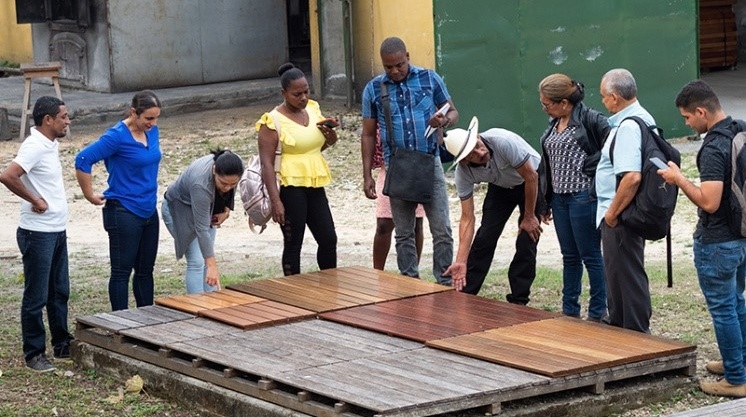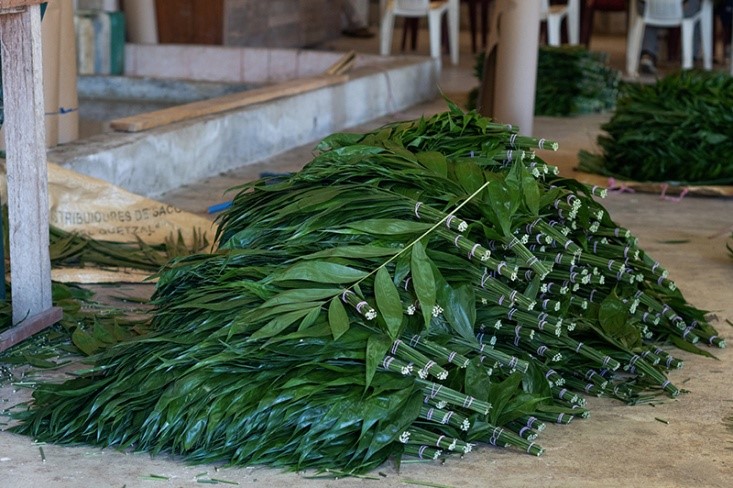Earning a living from the forest without degrading it: communities from the Maya Biosphere Reserve share their know-how
Communities living in the Maya Biosphere Reserve can earn a living from the forest without degrading it, thanks to the community forest management model set up by the Association of Forest Communities of Petén (ACOFOP) via community forest concessions. They have managed to implement sustainable forest management plans by using timber and non-timber products. They have also been able to launch tourism projects that exploit the immense archaeological heritage of the Maya people, and create wood processing companies. Furthermore, the communities have also increased their presence on the markets through the community enterprise FORESCOM.
|
|
|
Demonstration of flooring manufacturing using forest raw materials. |
All these practices are part of a community work model which builds the capacities of community organisations and associations of indigenous peoples living in forests.
Sustainable forest management, a common challenge
As this model is of great value in terms of replicability, the workshop organised in the context of the project aimed to share the experience with community organisations from El Salvador and Colombia which face the same challenges.
The participants included representatives of the Association of Forest Communities of Petén (ACOFOP), the Community Council of the People's Peasant Organisation of Alto-Atrato (COCOMOPOCA), the Association for Reconstruction and Municipal Development of El Salvador (ARDM) and the agency Expertise France, which is responsible for the implementation of the “Forests, Biodiversity and Ecosystems” component of the EUROCLIMA+ programme, alongside GIZ.
One of the reasons for the success of this exchange of experience was the fact of bringing together representatives from three countries who all work on implementing a sustainable management of their forests and in conflict or post-conflict situations. By managing, in these difficult situations, to bring about new solutions to ensure the livelihoods of communities and propose a different way of interacting with ecosystems, they provide a key lesson.
Creating alternatives for economic development in forests
“This forum of exchanges has been very useful for us as communities from the Colombian region of Alto-Atrato, as it has allowed us to open up to new ways of considering the forest and making a livelihood from it, but especially of finding practical alternatives to improve our incomes and living conditions while safeguarding ecosystems”, said Glenis Esther Garrido, one of the representatives of COCOMOPOCA.
The exchange workshop included a visit to the community of Carmelita, in Petén Department. This community lives in an area of 53,793 hectares where twenty different types of wood are exploited sustainably, in particular mahogany and cedar. This visit provided an opportunity to meet community forest cooperatives that process timber and non-timber products, such as chicle (latex gum), dwarf palm, pepper and honey. The community also organises sightseeing tours in the forest wildlife reserves, where you can see jaguars and get a close-up look at a wide range of biodiversity.
The ACOFOP team also gave a demonstration of its drone surveillance system which contributes to the protection of the territory, the prevention of fires and the control and monitoring of illegal activities. In Carmelita, it is essential to build the capacities of residents and offer them development opportunities that take the forest into account.
|
|
|
The dwarf palm (“fishtail”) benefits from a niche market. It is very popular in flower arrangements. |
Since 1991, the Association for Reconstruction and Municipal Development (ARDM) of El Salvador has been working on the development of a protection and management mechanism for Cinquera forest. ACOFOP’s experience has given it the incentive to identify new approaches and to seek to achieve a balance between forest management and the exploitation of forest products.
This type of activity organised by the EUROCLIMA+ programme creates synergies between the organisations, strengthens the regional platform in Central America and Colombia and increases the resilience of local communities to climate change.
The “Communities, forests and biodiversity: promoting dialogue, exchange and forest value chains to adapt and mitigate climate change” project is one of the nine projects financed under the “Forests, Biodiversity and Ecosystems” component of the EUROCLIMA+ programme, which is jointly managed by Expertise France and GIZ. The project is implemented by ICCO Cooperation. Further information about the project is available here.
EUROCLIMA+ is a programme financed by the European Union and cofinanced by the German Federal Ministry for Economic Cooperation and Development (BMZ), as well as by the French and Spanish governments. The objective of this programme is to promote ecologically sustainable and climate-resilient development in 18 Latin American countries, with a focus on the most vulnerable populations. It is jointly implemented by seven organisations: the Spanish Agency for International Development Cooperation (AECID), Agence Française de Développement (AFD), the Economic Commission for Latin America and the Caribbean (ECLAC), Expertise France, the International and Ibero-American Foundation for Administration and Public Policies (FIIAPP), the German Agency for International Cooperation (GIZ) and the United Nations Environment Programme (UNEP).
 More about EUROCLIMA+: euroclimaplus.org
More about EUROCLIMA+: euroclimaplus.org




